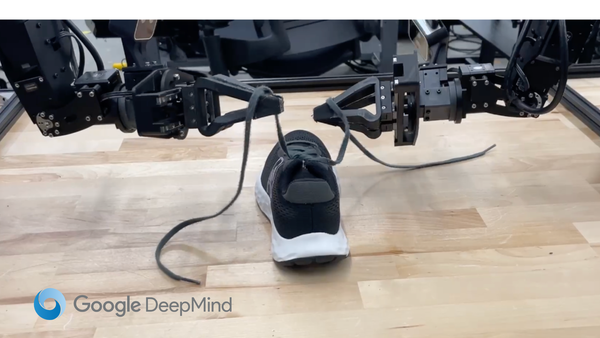1X’s Eve Closer to Full Autonomy, Beyond Imagination Partnership, and BIG Challenges

Exciting news in the humanoid robot market over the weekend! We’re seeing groundbreaking partnerships and technological advancements that are set to transform biomanufacturing and industrial operations.
From 1X Technologies’ strides towards fully autonomous robots to Scorpius Holdings’ innovative collaboration with Beyond Imagination, the future of robotics is looking promising.
Let's drive in...
1X’s Eve Humanoid Robot Getting Closer To Fully Autonomous
1X Technologies, an OpenAI-backed robotics firm, has made significant strides with its humanoid robot, Eve. The latest update demonstrates Eve’s ability to autonomously chain tasks together, marking a significant step towards fully autonomous robotic labor.
1X is focused on integrating diverse capabilities into a single neural network, enhancing the robot's ability to perform complex sequences of tasks through voice commands.

WHAT YOU NEED TO KNOW
- Task Chaining Breakthrough: Eve can now complete sequences of tasks autonomously by chaining simple tasks into more complex actions. This development showcases 1X's progress in creating a versatile and intelligent service robot.
- Advanced AI Integration: The team at 1X has decoupled task refinement from the integration process, allowing rapid improvements in task performance without negatively affecting other capabilities. This method leverages multiple small neural models to form a cohesive, goal-oriented system.
- Human-Guided Learning: By using a voice-controlled natural language interface, humans can direct the chaining of short-horizon capabilities into longer, more complex behaviors. This approach simplifies data collection and enhances the robot's ability to perform varied tasks seamlessly.
WHY YOU SHOULD CARE
Understanding the advancements made by 1X Technologies with Eve is crucial for several reasons:
- Innovative Task Integration: The ability to chain tasks autonomously represents a significant leap in robotics, paving the way for more practical and efficient service robots capable of performing complex tasks in real-world settings.
- Enhanced AI Capabilities: Integrating multiple small neural models into a unified system highlights a new direction in AI development, offering insights into how advanced AI can be utilized for more sophisticated robotic functions.
- Impact on Labor and Automation: As Eve progresses towards fully autonomous operation, the implications for industries reliant on manual labor are profound. This technology could revolutionize how tasks are performed in various sectors, from logistics to manufacturing, addressing labor shortages and improving efficiency.
Source: interestingengineering.com
Scorpius Holdings and Beyond Imagination Announce Humanoid Robot Partnership
Scorpius Holdings has announced a strategic partnership with Beyond Imagination to introduce autonomous AI-powered humanoid robots into American biomanufacturing. This collaboration aims to enhance the biomanufacturing industry's productivity, scalability, and efficiency.
The integration of these advanced robots is to address labor shortages and increase operational capacity, particularly in response to emergencies and high-demand scenarios.

WHAT YOU NEED TO KNOW
- Strategic Partnership: Scorpius Holdings and Beyond Imagination have joined forces to integrate AI-powered humanoid robots into biomanufacturing processes. This partnership aims to enhance production efficiency and reliability.
- 24/7 Operational Capabilities: Beyond’s humanoid robots are designed to operate nearly continuously, significantly improving manufacturing facility utilization and productivity. Their AI technology allows them to learn from and collaborate with human workers, continuously improving their capabilities.
- Hive Mind Technology: Beyond’s proprietary AI features Hive Mind capability, enabling robots to share knowledge and improve collective intelligence. This enhances operational efficiency and ensures that robots can adapt and excel in complex biomanufacturing environments.
WHY YOU SHOULD CARE
Understanding the implications of this partnership is crucial for several reasons:
- Enhanced Biomanufacturing Efficiency: Integrating autonomous humanoid robots addresses critical labor shortages and improves the scalability and efficiency of biomanufacturing processes. This is especially important in meeting the rising demand for rapid-scale production of life-saving therapies.
- Technological Innovation: These robots' use of advanced AI and Hive Mind technology represents a significant leap forward in biomanufacturing. This innovation can streamline workflows, reduce errors, and increase productivity, setting new industry standards.
- Crisis Preparedness: The ability of these robots to operate continuously and adapt to new tasks makes them invaluable during national emergencies such as pandemics. Their deployment can ensure rapid and efficient production of essential drugs, bolstering national preparedness and response capabilities.
Source: globenewswire.com
Humanoid Robots: Significant Progress Comes with Bigger Challenges
At the 14th China International Robot Summit Forum and the 10th Capek Award Ceremony in Wuhu, East China's Anhui Province, experts discussed the rapid progress and remaining challenges in developing humanoid robots.
Notable robots such as H1 from Unitree Robotics and Kuavo from Leju Robotics showcased impressive skills, but experts highlighted the significant technological hurdles that remain.

WHAT YOU NEED TO KNOW
- Impressive Showcases: Humanoid robots like Unitree Robotics' H1 and Leju Robotics' Kuavo demonstrated advanced abilities such as Tai Chi, running, and dancing, captivating attendees and illustrating the progress in robot dexterity and embodied intelligence.
- Technological Challenges: Despite advancements, significant challenges persist in tasks requiring nuanced actions like washing and cooking. The development of humanoid robots heavily depends on improving foundation models and high-performance AI computing, where China faces hurdles due to reliance on foreign chip technology.
- Future Directions: Experts emphasized the need for interdisciplinary development and improved "brains" for robots, integrating advanced AI and emotional interaction capabilities. Achieving true embodied intelligence close to human cognition remains a distant goal, requiring breakthroughs in understanding and cognitive capacities.
WHY YOU SHOULD CARE
Understanding the current state and challenges of humanoid robot development is critical for several reasons:
- Technological Innovation: The ongoing advancements and demonstrations of humanoid robots highlight the rapid progress in robotics. Staying informed about these innovations is crucial for recognizing potential applications and investment opportunities in emerging technologies.
- Strategic Development: The reliance on foreign technology for critical components like AI chips underscores the strategic importance of developing domestic capabilities. This has implications for national security and the global competitive landscape in high-tech industries.
- Interdisciplinary Potential: The future of robotics lies in cross-disciplinary integration, combining robotics with fields like micro-nano technology and life sciences. This convergence can lead to groundbreaking applications in medical care and other sectors, driving new opportunities for growth and collaboration.
Source: globaltimes.cn



